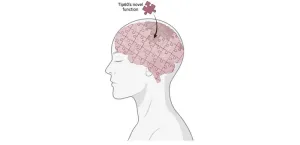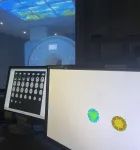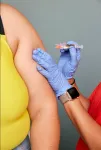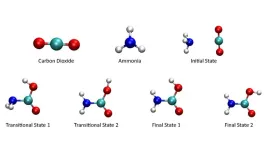(Press-News.org) A team of researchers from Aston University has developed a new technique that could be a game changer for the medical and drinks industries.
The technology enables insoluble drug/oil to be dissolved in water. The technique is novel because it doesn’t just mix the two together to make an emulsion, it makes oil soluble in water and has the potential to revolutionise a variety of medical treatments and improve drug delivery.
The technique was developed with Max Bio+ a spin out company founded by Professor Sunil Shah, a consultant ophthalmologist and professor at Aston University, and philanthropist Sean Ngu.
MaxBio’s technology is based on the synthesis of composite particles which fall under the broad category of nanoencapsulation (the process of encapsulating substances with various coating materials at the nanoscale range). The nano composite particles comprise of synthetic polymers and lipid molecules which provides a unique environment to improve drug solubility and control the release.
The novelty of the new technology is the composition of the delivery system as well as the simplicity and flexibility of the manufacturing process to synthesize such systems. This is an emerging area of research which is very much in its infancy and is likely to grow in the next decade.
The research team, which was led by Professor Afzal R Mohammed and Dr Daniel Kirby from Aston Pharmacy School and Professor Sunil Shah from the School of Optometry, started its research by looking at eye drops because there was sufficient evidence that the anti-inflammatory, anti-microbial, anaesthetic and analgesic properties of cannabidiol (known as CBD) could help patients with dry eyes.
The team was challenged with how to get the CBD delivered to the eye - when dropping oil directly onto the eye was not an option. Whilst creating the eye drops the researchers discovered a new way of creating a soluble CBD product by making the oil completely soluble in water. This technique was found to be ideal for eye drops – and a wide range of other applications.
They also found that the technique works just as well with any oil-based product, opening the door to a range of new products and breakthroughs in the future. For example, the researchers are now looking at the delivery of insulin for diabetics.
Laboratory testing has indicated that Max Bio+’s technique makes CBD much easier for the body to absorb. When taken via the mouth, it gives up to six times greater absorption of the same amount of CBD into the body. Max Bio+’s resulting CBD liquid is 25,000 times more soluble than standard CBD.
Professor Afzal R Mohammed, Professor of Pharmaceutics and Associate Dean of impact and knowledge exchange at Aston University, said: "We are delighted to work with MaxBio+ on this transformative project. Our work at Aston University has led to the development of a novel composite nano particle system which has the potential to deliver a broad range of poorly soluble compounds that have a controlled release.
"This is a great exemplar of translational research at Aston Pharmacy School and highlights how our business partnerships can deliver real world impact. It feels even more significant as we celebrate 100 years of pharmacy education and research at Aston University this year."
Dr Daniel Kirby, Head of Pharmaceutical Sciences at Aston Pharmacy School, said: “An innovative partnership such as this one epitomises what we are striving to achieve: engaging with industry partners to ensure that our research has impact, relevance and meaningful benefits.
“The outputs of the research thus far have exceeded our own expectations, with enormous potential to have significant reach into a wide range of applications and markets, benefitting patients and consumers alike, especially within the exponentially increasing area of CBD products.”
The new technique is used to create a clear, tasteless, odourless product manufactured without alcohol, or heat. The clear CBD liquid can then form the basis for a variety of products including drinks, drug delivery, inhalers, food, and sports recovery.
The researchers also found that the liquid can be freeze-dried to create a powder making transport easier - further opening up the range of potential applications.
Professor Sunil Shah, consultant ophthalmologist and professor at Aston University, said: “This breakthrough in mixing oil and water is a genuine gamechanger. Just imagine how it can change the health industry by allowing the oral delivery of many drugs that currently have to be injected. Insulin a prime example. This could spell the end of painful injections for thousands of diabetics.
“Then there are the eye drops and myriad ways to add CBD to food and beverages without compromising on taste.”
Using the new technique, Professor Shah and his team are working on CBD eye drops, CBD beer and looking at ways that insulin delivered under the tongue could help diabetics.
END
Aston Pharmacy School researchers develop new technique mixing oil and water to improve drug delivery
A team of researchers from Aston University has developed a new technique that could be a game changer for the medical and drinks industries.
2023-03-14
ELSE PRESS RELEASES FROM THIS DATE:
New guideline introduces recommendations for optimal timing of elective hip or knee arthroplasty
2023-03-14
ATLANTA — The American College of Rheumatology (ACR) and the American Association of Hip and Knee Surgeons (AAHKS) released a summary of its new guideline titled “the Optimal Timing of Elective Hip or Knee Arthroplasty for Patients with Symptomatic Moderate to Severe Osteoarthritis or Osteonecrosis Who Have Failed Nonoperative Therapy.” The ACR and AAHKS have worked together before, creating guidelines for Perioperative Management of Antirheumatic Medication in Patients with Rheumatic Diseases Undergoing Elective Total Hip or Total Knee Arthroplasty in 2017 and 2022. While those guidelines focus on which medications ...
Solving the Alzheimer’s disease puzzle: One piece at a time
2023-03-14
Researchers from Drexel University have uncovered a novel regulatory mechanism in the brain that is essential for making the right kinds of proteins that promote healthy brain function, and its malfunctioning may be an early contributor of the development of Alzheimer’s disease.
Brain cells are continuously undergoing changes in response to environmental stimuli and to record new memories. Such complex brain capability relies on the ability of brain cells to generate different functional variants of the same protein using a process known as alternative RNA splicing.
Recent studies have reported defects ...
Stephen Fantone elected chair of Hertz Foundation’s board of directors
2023-03-14
The Fannie and John Hertz Foundation, a nonprofit organization dedicated to empowering the most promising innovators in science and technology, has announced the election of Stephen D. Fantone as chair of its board of directors.
Fantone is the founder and president of Optikos Corporation, which provides innovative applications of optical technology, both products and services, to commercial, government and consumer products organizations worldwide. Fantone is a recognized expert in optical engineering and optical product ...
WVU lab’s game-changing high-performance semiconductor material could help slash heat emissions
2023-03-14
Researchers at West Virginia University have engineered a material with the potential to dramatically cut the amount of heat power plants release into the atmosphere.
A team led by Xueyan Song, professor and George B. Berry Chair of Engineering at the Benjamin M. Statler College of Engineering and Mineral Resources, has created an oxide ceramic material that solves a longstanding efficiency problem plaguing thermoelectric generators. Those devices can generate electricity from heat, including power plant heat emissions, which contribute to global warming.
The breakthrough ...
William Evans joins Hertz Foundation board of directors
2023-03-14
The Fannie and John Hertz Foundation, a nonprofit organization dedicated to empowering the most promising innovators in science and technology, has announced the election of William Evans to its board of directors.
Evans is the physics division leader in the Physical and Life Sciences Directorate at Lawrence Livermore National Laboratory (LLNL), which works to enable United States security and global stability and resilience by empowering multidisciplinary teams to pursue bold and innovative science and technology.
“It is imperative that the Hertz Foundation’s board of directors ...
COVID-19 pandemic has long-lasting effects on adolescent mental health and substance use
2023-03-14
March 14, 2023-- The COVID-19 pandemic has had a long-lasting impact on adolescent mental health and substance use according to a new population-based study are based on survey responses from a nationwide sample of over 64,000 13–18-year-old North American and Icelandic adolescents assessed prior to and up to two years into the pandemic. The study was conducted by faculty at Columbia University Teachers College and Mailman School of Public Health and a team of Icelandic and other North American clinical, behavioral and social scientists. The findings are published in published in The Lancet Child & Adolescent Health.
This same research team ...
Learning behavior differs between OCD and problem gambling
2023-03-14
Shinsuke Suzuki at The University of Melbourne, Australia reports distinct patterns of reward-seeking behavior between obsessive compulsive disorder (OCD) and problem gambling, in a study publishing in the open access journal PLOS Biology on March 14th. OCD is associated with lower-than-normal learning rates when rewards are less than expected. On the other hand, people with problem gambling exhibit boosted and blunted learning from rewards higher and lower than expected, respectively.
Understanding the differences between obsessive and addictive behaviors is essential for developing treatments for conditions like problem gambling ...
Global maternal Strep B vaccination program could save millions and prevent thousands of deaths worldwide
2023-03-14
A global maternal immunization program for group B Streptococcus - strep B - would save millions in healthcare costs by reducing death and disability, but without tiered pricing, equitable access would likely not be achieved. Several vaccines are currently under development, and an assessment of the impact and value of a global program is publishing March 14th in the open access journal PLOS Medicine. It finds that this could avert over 200,000 cases and more than 31,000 deaths, and reduce disability in children.
Strep B can infect pregnant women and their babies, causing sepsis and meningitis in newborns, and sometimes leading to death or disability. ...
Dark current modeling of thick perovskite X-ray detectors
2023-03-14
X-ray detection is widely used in medical imaging, radioactivity detection, security checking, industrial flaw inspection, and so on. In recent years, metal halide perovskites have demonstrated excellent performances in the detection of X-rays and gamma-rays. However, most studies focus on perovskite single-pixel devices. To achieve the application goal of X-ray imagers, the detectors should be integrated with pixel circuits. This means that the device dark current is an important figure of merit to be considered. The low dark current can guarantee ...
Cleaning up the atmosphere with quantum computing
2023-03-14
WASHINGTON, March 14, 2023 – The amount of carbon dioxide in the atmosphere increases daily with no sign of stopping or slowing. Too much of civilization depends on the burning of fossil fuels, and even if we can develop a replacement energy source, much of the damage has already been done. Without removal, the carbon dioxide already in the atmosphere will continue to wreak havoc for centuries.
Atmospheric carbon capture is a potential remedy to this problem. It would pull carbon dioxide out of the air and store it permanently to reverse the effects of climate change. Practical carbon capture technologies are still in the early stages of development, with the most promising involving ...
LAST 30 PRESS RELEASES:
Public and patient involvement in research is a balancing act of power
Scientists discover “bacterial constipation,” a new disease caused by gut-drying bacteria
DGIST identifies “magic blueprint” for converting carbon dioxide into resources through atom-level catalyst design
COVID-19 vaccination during pregnancy may help prevent preeclampsia
Menopausal hormone therapy not linked to increased risk of death
Chronic shortage of family doctors in England, reveals BMJ analysis
Booster jabs reduce the risks of COVID-19 deaths, study finds
Screening increases survival rate for stage IV breast cancer by 60%
ACC announces inaugural fellow for the Thad and Gerry Waites Rural Cardiovascular Research Fellowship
University of Oklahoma researchers develop durable hybrid materials for faster radiation detection
Medicaid disenrollment spikes at age 19, study finds
Turning agricultural waste into advanced materials: Review highlights how torrefaction could power a sustainable carbon future
New study warns emerging pollutants in livestock and aquaculture waste may threaten ecosystems and public health
Integrated rice–aquatic farming systems may hold the key to smarter nitrogen use and lower agricultural emissions
Hope for global banana farming in genetic discovery
Mirror image pheromones help beetles swipe right
Prenatal lead exposure related to worse cognitive function in adults
Research alert: Understanding substance use across the full spectrum of sexual identity
Pekingese, Shih Tzu and Staffordshire Bull Terrier among twelve dog breeds at risk of serious breathing condition
Selected dog breeds with most breathing trouble identified in new study
Interplay of class and gender may influence social judgments differently between cultures
Pollen counts can be predicted by machine learning models using meteorological data with more than 80% accuracy even a week ahead, for both grass and birch tree pollen, which could be key in effective
Rewriting our understanding of early hominin dispersal to Eurasia
Rising simultaneous wildfire risk compromises international firefighting efforts
Honey bee "dance floors" can be accurately located with a new method, mapping where in the hive forager bees perform waggle dances to signal the location of pollen and nectar for their nestmates
Exercise and nutritional drinks can reduce the need for care in dementia
Michelson Medical Research Foundation awards $750,000 to rising immunology leaders
SfN announces Early Career Policy Ambassadors Class of 2026
Spiritual practices strongly associated with reduced risk for hazardous alcohol and drug use
Novel vaccine protects against C. diff disease and recurrence
[Press-News.org] Aston Pharmacy School researchers develop new technique mixing oil and water to improve drug deliveryA team of researchers from Aston University has developed a new technique that could be a game changer for the medical and drinks industries.






